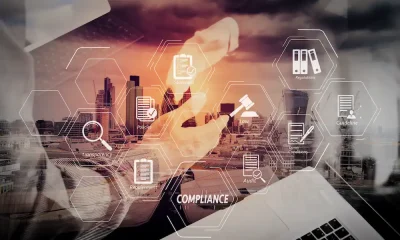Security
Understanding IT Security – The Business Owners’ Quick Guide

Cybersecurity is often emphasized for large firms and neglected by small businesses, with a whopping 87 percent of small business owners thinking that their firms are not at risk of being hacked. The fact is that approximately 50 percent of small businesses are likely to be hacked.
Hackers love small businesses, mainly because they don’t have too much data, their data is quite specific, and they also have very little information technology (IT) security. Hackers can steal preliminary information, which they can use to collect even more data.
Many businesses rely heavily on online transactions. Cybercriminals are constantly looking for new ways to steal information, so small businesses must take steps to prevent data breaches.
Prepare your business to fight against cyber attacks in every way possible with some practical steps like these in our business blog post.
- Set up Firewalls
- Use Antivirus software
- Back up data
- Update software
- Monitor online activity
- Train staff
- Create and use a Cyber security policy
Set up Firewalls
A firewall is a security measure that prevents unauthorized access to your network. It does this by blocking incoming connections to ports that are not needed. If you use a router, make sure it has port forwarding enabled so that any traffic coming into your network goes through the firewall.
When you connect to the Internet, your computer sends data packets (bits) to other computers via the Internet. These bits travel across the Internet using protocols such as TCP/IP, UDP, HTTP, FTP, etc. Each protocol uses a specific port number. Port numbers are used to identify which service is being accessed. For example, if you want to send an email, you would use SMTP (port 25). You would use HTTP (port 80) if you wanted to download a file.
Train Your Employees
Your employees are an essential part of your cybersecurity plan and should, therefore, participate as such. What you need is a cybersecurity policy for the entire business. It should have the best practices and procedures that your employees should follow. There should be employees for keeping everything and everyone safe, from the customer to the employee to the entire business. The policy should also have protocols that the employees can follow in case there is a cybersecurity breach.
Cyber Security Policy
In case you’re having trouble coming up with your own policy, don’t worry about it. You can choose any of many IT security frameworks out there. The best one to go for is the ISO 27001 security framework as laid out by the International Organization for Standardization.
You should also remind your employees to create strong passwords for their accounts, mobile devices and desktop computers. They should also use two-factor authentication as much and as often as they can.
Update Software
It’s also important to keep software updated. If you use any software that connects to the internet, make sure you update it frequently. This includes antivirus programs, operating systems, and web browsers.
Keeping your laptops, desktops and mobile devices updated is something you should regularly do, especially when it comes to the web browsers and operating systems you use.
For any business software you frequently use, check for the latest versions and update the software. Go for cloud software whenever you can as it is automatically updated by the software vendor. If your employees use their smartphones for work, have them use updated software and also install a security app.
Backup Your Data
The data in your business should be regularly backed up. If that data ever gets lost or stolen, you should have a copy or copies of it somewhere.
All the important information in your business should be backed up, including files, databases, and other important documents. Also, consider using an online backup service such as Carbonite or Mozy. These services will automatically back up your computer and mobile devices, making them easy to restore when necessary.
Whatever lies on desktops at your business should have a copy lying in the cloud, with both copies being well secured. You should also keep your data encrypted and protected by unique and strong passwords.
Access Should Be Limited
Not just anyone should be allowed access to your computers and business accounts, even if they are well-known and trusted. Only authorized people should have access to data. Under no circumstances should you allow a client to borrow a company laptop to check something.
The rank and position of the employees might determine what they have access to. Make sure they stick to the policy you institute for them. They also shouldn’t share sensitive account information, such as passwords, with each other.
Monitor Activity Online
One of the easiest ways to spot potential threats is by monitoring activity online. Look at who is visiting your website and how often. Are there any unusual patterns? Do you see anything suspicious? If you suspect something is amiss, contact your web host immediately. You should be able to find information about what kind of security measures your site has in place from your hosting company. If you notice any strange activity on your site, such as sudden spikes in traffic or visitors, it could indicate a problem. Contact your web host immediately.
Summing Up
All of these measures should help protect your business information systems. Make sure you and your employees do whatever you can to keep your data safe and thwart the efforts of hackers.
Preventing a cyberattack and subsequent data loss is a far more efficient measure for your small business. You don’t need the cost and stress of relying on data recovery after your systems have been compromised.






